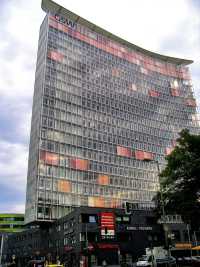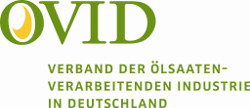Symposium on MCPD Esters and Glycidyl Esters
Analytics, Toxicology, Risk Assessment, Mitigation – Where we are today?
20-21 June 2017, Rocket Tower Conference Center, Berlin
Dear Sir or Madam,
We would like draw your attention to a Symposium on 2-MCPD and 3-MCPD esters and glycidyl
esters which will be held in Berlin, Germany on 20th – 21st June 2017, organized by the German
Society for Fat Science (Deutsche Gesellschaft für Fettwissenschaft e. V.; DGF) and supported by the
Association of the Oilseed crushing and Oil refining Industry in Germany (OVID Verband der
ölsaatenverarbeitenden Industrie in Deutschland e. V.) and the German Federation for Food Law and
Food Science (Bund für Lebensmittelrecht und Lebensmittelkunde e. V.; BLL).
In November 2007, after the first findings of fatty acid esters of 3-monochloro-1,2-propanediol (3-
MCPD) by the Official laboratory in Stuttgart (Chemisches und Veterinäruntersuchungsamt; CVUA)
and the Max Rubner-Institut (Federal Research Institute of Nutrition and Food; MRI), the German
Federal Institute for Risk Assessment (Bundesinstitut für Risikobewertung; BfR) and the German
Federal Ministry of Food and Agriculture (Bundesministerium für Ernährung und Landwirtschaft;
BMEL) defined a need for action to reduce the levels of 3-MCPD esters in edible oils and fats as well
as fat containing foods. Free 3-MCPD was observed causing benign tumors, and we know today that
free 3-MCPD is released from the esters in the human body. One year later 2-MCPD and glycidyl
esters have been found in refined oils. Especially palm oil products showed higher levels of glycidyl
esters, the free compound Glycidol has been classified as genotoxic carcinogenic to humans.
Based on the BfR statement, considerable efforts have been made by interested and affected
stakeholders such as industry, research institutions, analytical laboratories, and governmental
institutions. This work resulted in deeper knowledge of the toxicological assessment, validated
analytical methods for the determination of the esters in edible fats and oils, possibilities for the
mitigation of the esters during oil processing and finally comprehensive measures for the risk
management.
However, several questions are still open. So far, we have only one validated method for compound
food, i.e. margarines, spreads and dressings. For other food matrices, in-house validated methods
exist. How can these methods be externally validated? Divergent tolerable daily intake (TDI) values
have been defined by the European Food Safety Authority (EFSA) and by the Joint FAO/WHO Expert
Committee on Food Additives (JECFA). What are the consequences? What is the current state of the
risk assessment and management today? Where does the application of mitigation measures of the
industry stand today? What about the formation of 2- and 3-MCPD esters as well as glycidyl esters
during food processing in industry and at home? What do we know about the levels of the esters in
processed food?
The aim of the symposium is to give answers to these questions and to summarize the state of
knowledge with respect to 2- and 3-MCPD esters as well as glycidyl esters. Ten years after the first
findings qualified experts will discuss relevant aspects for formation and mitigation during oil and food
processing, via analytical approaches for various foods and the toxicological assessment to regulatory
measures.
The symposium aims to reach all interested parties, e.g. people from oil and food processing industry,
trade, official and private laboratories, but also decision-makers in authorities, people responsible for
consumer protection, nutritionists and journalists.
Therefore we would like to ask you to save the date for the symposium on 2-MCPD and 3-
MCPD esters as well as glycidyl esters on 20th – 21st June 2017 in Berlin. In addition, you are
encouraged to submit your poster abstract until 19th May 2017 to
bertrand.matthaeus@mri.bund.de. Further information, a detailed program and registration
details will be made available here soon.
Kind regards,
Gerhard Brankatschk, OVID Association of the Oilseed crushing and Oil refining Industry in Germany
Dr. Birgit Christall, BLL, German Federation for Food Law and Food Science
Dr. Bertrand Matthäus, MRI – Max Rubner-Institut (Federal Research Institute of Nutrition and Food)
Programme
[update 18.05.2017]
You are kindly invited to submit an abstract for a poster presentation.Please use
this model and send the abstract to
Bertrand.Matthaeus@mri.bund.de
The Congress Dinner takes place 20 June 2017 at the
Solar Sky Lounge, Stresemannstr. 76, 10963 Berlin
Ticketed event, registration required.
The price is 50 Euro + VAT including drinks
Tuesday, 20 June 2017
| 11:00-12:00 | <<<<> | Registration and Coffee |
| 12:00-12:15 | | Opening and Welcoming Addresses
Bertrand Matthäus, Max Rubner-Institut (MRI), Detmold, Germany
Gerhard Brankatschk, OVID, Berlin, Germany
Birgit Christall, BLL, Berlin, Germany |
| 12:15-12:45 | | A Review on Ten Years 3-MCPD Esters and Glycidyl Esters in Fats and Oils
Bertrand Matthäus, MRI, Detmold, Germany |
| 12:45-13:15 | | EU Policy on MCPD Esters and Glycidyl Esters
Frans Verstraete, European Commission, Brussels, Belgium |
| 13:15-13:45 | | Where we are today with the Mitigation of 2- and 3-MCPD Esters and Glycidyl Esters?
Frank Pudel, Pilot Pflanzenöltechnologie Magdeburg (PPM), Magdeburg, Germany |
| 13:45-14:00 | | Poster Highlights |
| 14:00-14:30 | | Coffee Break, Poster Presentation and Networking |
| 14:30-15:00 | | Mitigation Strategies for 3-MCPD Esters and Glycidol Esters during Vegetable Oil Refining
Nils Hinrichsen, ADM, Hamburg, Germany |
| 15:00-15:30 | | Palm Oil Sustainability and 3-MCPD Esters and Glycidyl Esters Mitigation
Gerhard Neuberger, Ferrero, Stadtallendorf, Germany |
| 15:30-15:45 | | Approaches for the Mitigation of 3-MCPD Esters and Glycidyl Esters in Baby Food
Frederic Destaillats, Nestlé, Vevey, Switzerland |
| 15:45-16:00 | | FEDIOL-Perspective to tackle 3-MCPD esters and Glycidyl esters
Nathalie Lecocq, FEDIOL, Brussels, Belgium |
| 16:00-16:30 | | Coffee break, Poster Presentation and Networking |
| 16:30-17:15 | | Current Aspects of Toxicology and Risk assessment of 2-MCPD Esters, 3-MCPD Esters and Glycidyl Esters
Alfonso Lampen, Bundesinstitut für Risikobewertung (BfR), Berlin, Germany |
| 17:15-17:45 | | Impact of Hazard Characterization Methodology on Management of MCPD Esters and Glycidyl Esters
in Food Raw Materials
Gabriele Scholz, Nestlé, Lausanne, Switzerland |
| 17:45-18:15 | | Current Status of Benchmark Dose Modelling for 3-Monochloropropane-1,2-diol (3-MCPD)
Michael Dourson, University of Cincinnati, USA (via Skype) |
| 19:00 | | Conference Dinner (Registration required) |
Wednesday, 21 June 2017
| 09:00-09:40 | <<<<> | Overview on Prevalent Analytical Methods for Fats,
Oils and Compound Foodstuffs - What are the Advantages and Drawbacks?
Jan Kuhlmann, SGS, Hamburg, Germany |
| 09:40-10:00 | | Automation of the Sample Preparation for the Determination of 3-MCPD Esters and Glycidyl Esters
according to Method DGF-VI 18 (10) - Possibilities and limits
Tobias Uber, Axel Semrau, Sprockhövel, Germany |
| 10:00-10:20 | | The Development and Application of the Automated Method for the Quantification of 3-MCPD Esters,
2-MCPD Esters and Glycidyl Esters in Edible Oils and Fats
Ralph Zwagerman, IOI Loders Croklaan, Wormerveer, The Netherlands |
| 10:20-10:50 | | Validated vs. Not validated – Challenges in Analytical Measurements of MCPD Esters and Glycidyl Esters
in Different Food Matrices
Karel Hrncirik, Unilever, Vlaardingen, The Netherlands |
| 10:50-11:20 | | Coffee Break, Poster Presentation and Networking |
| 11:20-11:50 | | Formation Pathways for 3-MCPD Esters and Glycidyl Esters
Frederic Destaillats, Nestlé, Vevey, Switzerland |
| 11:50-12:10 | | Toolbox for the Mitigation of 3-MCPD Esters and Glycidyl Esters in Food
Birgit Christall, BLL, Berlin, Germany |
| 12:10-12:40 | | Study of 3-MCPD Esters and Glycidyl Esters in Malaysia
Raznim Razak, Malaysian Palm Oil Board (MPOB), Kajang, Malaysia |
| 12:40-13:40 | | Lunch |
| 13:40-14:10 | | Monitoring Survey on the Presence of 3-MCPD Esters and related Compounds in Food
Klara Jirzik, BVL, Berlin, Germany |
| 14:10-14:40 | | Stiftung Warentest Results on 3-MCPD Esters and Glycidyl Esters in Food
Jochen Wettach, Stiftung Warentest, Berlin, Germany |
| 14:40-15:10 | | Formation of 3-MCPD Esters and Glycidyl Esters during Food Preparation - What happens during Frying,
Baking and Barbecuing?
Bertrand Matthäus, MRI, Detmold, Germany |
| 15:10-15:40 | | Strategies for the Minimization of Free and Bound 3-MCPD and Glycidol in Fish Products
Sybille Merkle, University of Applied Sciences Hamburg, Hamburg, Germany and Ute Ostermeyer, MRI, Kiel, Germany |
| 15:40-15:50 | | MCPD Esters and Glycidyl Esters in Fat Containing Foods - a Technical and Regulatory Perspective of
FoodDrinkEurope, the Umbrella Organisation of the European Food and Drink Industry
Beate Kettlitz, FoodDrinkEurope, Brussels, Belgium |
| 15:50-16:00 | | Summary and Outlook
Bertrand Matthäus, MRI, Detmold, Germany and Jan Kuhlmann, SGS, Hamburg, Germany |
The venue
[06.14.2017]

The congress takes place at the
Rocket Tower Conference Center
Charlottenstraße 4
10969 Berlin, Germany
T. +49 30 300 13 18-00
F. +49 30 300 13 18-99
Public Transport: Underground line U6, station Kochstr/ Checkpoint Charlie
see the
routemap for details
Picture: Wikipedia, Francisco Anzola
Accommodation
[06.06.2017]
The city of Berlin offers a nice service to find your perfect hotel.
see
http://www.berlin.de/en/accommodation/
Nearby are a Mercure Hotel and Mondrian Suites Hotel
Registration
[24.04.2017]
Fees
[24.04.2017]
Status
|
until 2 June 2017 |
after 2 June 2017 |
Member*
|
390 Euro |
440 Euro |
Non-Member
|
440 Euro |
490 Euro |
public service
|
390 Euro |
440 Euro |
Students
|
140 Euro |
210 Euro |
*individual DGF members and employees of DGF or OVID member companies
The registration fee includes:
-Entry to the scientific programme
-Book of abstracts or similar
-List of participants
-Coffee Break beverages
-Lunch 21 June
After registration you will receive an invoice.
Paying by Bank Transfer:
Please transfer the total fees (free of bank commission) to:
Deutsche Gesellschaft für Fettwissenschaft e.V.
Konto 240 1230 00
Deutsche Bank AG, Frankfurt/ Main
BLZ 500 700 24
IBAN DE05 500 700 240 240 1230 00
SWIFT/ BIC DEUT DE DBFRA
Cancellations
[19.04.2017]
Cancellations must be in writing and are effective after written confirmation by DGF.
Cancellations received on or before 2 June 2017 will be refunded minus a 50 Euro processing fee.
There will be no refund for cancellations after 2 June 2017 or No-Shows. However, substitute participants can be named anytime without costs.
If the congress is cancelled for whatever reason, paid fees will be refunded. Further recourse is excluded.
Organiser
[06.04.2017]
Deutsche Gesellschaft für Fettwissenschaft (DGF) e.V.
Postfach 90 04 40
60444 Frankfurt/Main
Telefon: 0 69/79 17-533
Fax: 0 69/79 17-564
E-Mail:
info@dgfett.de


